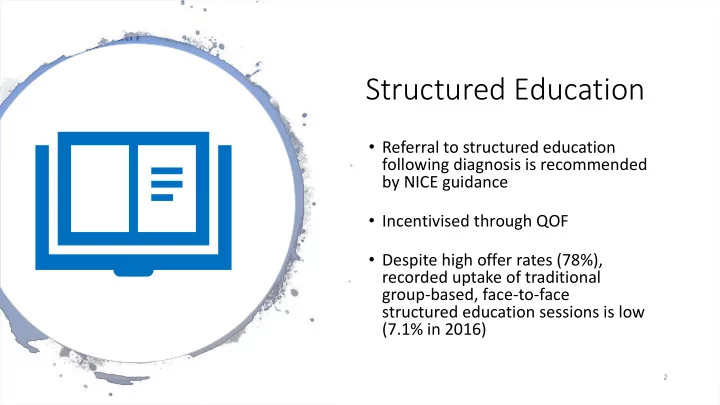

Structured Education • Referral to structured education following diagnosis is recommended by NICE guidance • Incentivised through QOF • Despite high offer rates (78%), recorded uptake of traditional group-based, face-to-face structured education sessions is low (7.1% in 2016) NHS England and NHS Improvement 2
Diabetes Prevention • Healthier You: Diabetes Prevention Programme achieved full national coverage last year • Reached 100K referrals to the Programme 12 months ahead of plan • Whilst the programme has high rates of uptake, it is clear that those least likely to take up an offer or subsequently drop out early are those of working age. NHS England and NHS Improvement 3
• Education programmes been traditionally group based • Attendance may be challenging for those who work, have family, or caring commitments • Patient needs vary over time – structured education shortly after diagnosis may not meet emerging needs over time NHS England and NHS Improvement 4
• Online education programmes may be more accessible • Improved experience for those who prefer not engage with face to face education • Potential to be highly scalable; with low unit cost (depending on delivery model) NHS England and NHS Improvement 5
Diabetes Prevention Pilots • 5,337 people with non-diabetic hyperglycaemia referred between January 2018 and December 2019 • 68% conversion of referrals to registrations (average) • 68% of registrations were people <65 years compared with 45% of attendees at initial assessment for the F2F service NHS England and NHS Improvement 6
• 80% of people that registered continued to engage @ 3 months (average) • Weight loss -4kg (-4.5%) for those followed up @ 6 months (average) • HbA1c reduction – 1.6mmol/mol for those followed up @ 6 months (average) • Full evaluation report with 12 month findings published June 2020 NHS England and NHS Improvement 7
Scaling Prevention – New DPP Framework • Contracts under the new framework include digital provision • F2F providers (in the main) have sub-contracted with providers of digital programmes • Digital available to those unable / unwilling to attend F2F programme • New contracts called off from summer of 2019 • 45% of the England now has a digital provider in place • Full national coverage of new contracts 2020/2021 • Initial cap of 20% of total capacity for digital • Review of cap when full evaluation report with 12 month outcomes published June 2020 NHS England and NHS Improvement 8
Transformation Funding for Digital SE ➢ We have supported CCGs with Transformation Funds allocated to structured education (approx. £10.5 in 19/20) to be used to commission digital alternatives ➢ Clear expectations around the audit of outcomes to contribute towards the current evidence gaps where Transformation Funding used NHS England and NHS Improvement 9
Self Care T2DM - Test Beds • £2.2m invested in the Wave 2 Test Bed programme for a specific challenge around self-management and support for people with Type 2. • Programme will enable robust real world evaluation of both implementation and outcomes; • Test Bed Projects are focussing on combinatorial innovations including: ✓ Access to digital shared care plans ✓ Prompts for individuals to attend care process based on clinical record info ✓ Access to, and visualisation of EHR data to support understanding clinical data ✓ Setting and monitoring of goals, and achievements (weight, HbA1C, Chol, BP) NHS England and NHS Improvement ✓ Access to information and self- management support via remote coaching, and psychological 10 therapies
Healthy Living for People with Type 2 Diabetes • Digital tool designed to support self-management of Type 2 Diabetes • Formerly referred to as ‘ HeLP Diabetes’ • Tool will be available for free to every CCG across England with no limits on access • Currently in development and being shaped according to feedback from users, clinicians and commissioners • RCT showed modest but significant improvements in HbA1c and, in newly diagnosed, reduction in diabetes-related distress • Cost savings of £111 per person in healthcare utilisation vs usual care NHS England and NHS Improvement 11
Timelines for Development NHS England and NHS Improvement 12
Timelines for Rollout • December ’19 : Appointment of an external evaluator • January ’20 : Begin rollout to a small group of users to test the product in a real world setting. This will be an critical period for the project, with many iterative steps as the product is refined • Spring ’20 : Continued rollout to more practices and areas of the country – refining the techniques used to implement the product in new practices and ICSs • Summer ’20 : Removal of the “beta” tag, national campaign to announce product and begin rollout across England NHS England and NHS Improvement 13
Recommend
More recommend